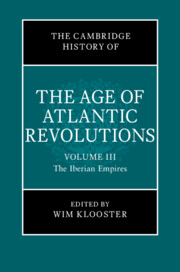Book contents
- The Cambridge History of the Age of Atlantic Revolutions
- The Cambridge History of the Age of Atlantic Revolutions
- The Cambridge History of the Age of Atlantic Revolutions
- Copyright page
- Contents
- Figures
- Maps
- Tables
- Contributors to Volume III
- Preface
- Introduction
- Part I The Spanish Empire
- Part II Brazil, Portugal, and Africa
- 16 Overview: The Independence Era in the Luso-Brazilian World
- 17 Portugal’s Social and Political Change from the Ancien Régime to Liberalism
- 18 Conservative Tracks toward Independence: Transfer of the Court to Rio de Janeiro, the Porto Revolution, and Brazilian Autonomy
- 19 Building New Brazilian Institutions
- 20 Slaves, Indians, and the “Classes of Color”: Popular Participation in Brazilian Independence
- 21 Brazil and the Independence of Spanish America: Parallel Trajectories, Linked Processes (1807–1825)
- 22 Waves of Sedition across the Atlantic: Liberal Politics in Angola in the Wake of Brazilian Independence (c. 1817–1825)
- Index
20 - Slaves, Indians, and the “Classes of Color”: Popular Participation in Brazilian Independence
from Part II - Brazil, Portugal, and Africa
Published online by Cambridge University Press: 20 October 2023
- The Cambridge History of the Age of Atlantic Revolutions
- The Cambridge History of the Age of Atlantic Revolutions
- The Cambridge History of the Age of Atlantic Revolutions
- Copyright page
- Contents
- Figures
- Maps
- Tables
- Contributors to Volume III
- Preface
- Introduction
- Part I The Spanish Empire
- Part II Brazil, Portugal, and Africa
- 16 Overview: The Independence Era in the Luso-Brazilian World
- 17 Portugal’s Social and Political Change from the Ancien Régime to Liberalism
- 18 Conservative Tracks toward Independence: Transfer of the Court to Rio de Janeiro, the Porto Revolution, and Brazilian Autonomy
- 19 Building New Brazilian Institutions
- 20 Slaves, Indians, and the “Classes of Color”: Popular Participation in Brazilian Independence
- 21 Brazil and the Independence of Spanish America: Parallel Trajectories, Linked Processes (1807–1825)
- 22 Waves of Sedition across the Atlantic: Liberal Politics in Angola in the Wake of Brazilian Independence (c. 1817–1825)
- Index
Summary
Contrary to the long-standing historical view that describes Brazilian independence (1822) as a peaceful pact among elites dominated by Emperor Pedro I, this chapter examines popular participation in this conflictual process. Recent scholarship has shown how elite divisions opened space for popular political actors, as did conflicts and military mobilizations in several provinces. The public sphere expanded by Portuguese constitutionalism encompassed broad sectors of society. Slaves understood the Portuguese constitution as a liberating document and used military mobilizations to pursue their interests. Indians under Luso-Brazilian rule demanded rights used the new language of citizenship to demand relief from labor and militia service while semi-autonomous groups aligned themselves with the contending parties to defend their claims to land. Widespread worries about the “classes of color” indicate the diverse ways in which free people of color’s demands rights and inclusion in the new polity threatened the status quo. While these popular challenges were largely defeated by 1825, they profoundly shaped the independence process and left a long legacy.
Keywords
- Type
- Chapter
- Information
- The Cambridge History of the Age of Atlantic Revolutions , pp. 520 - 546Publisher: Cambridge University PressPrint publication year: 2023

